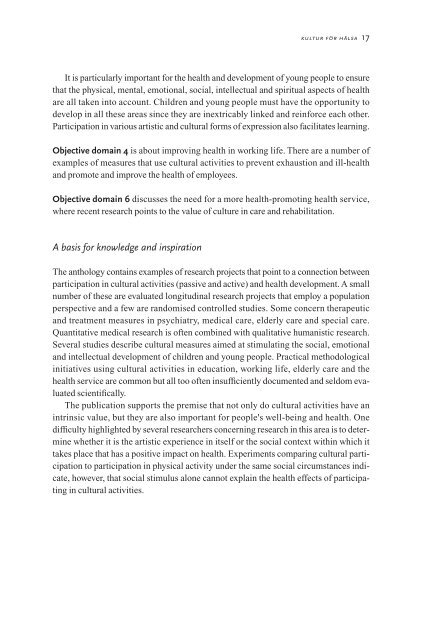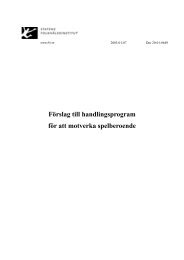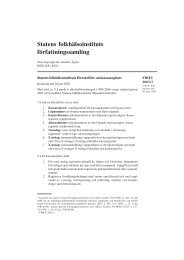Kultur för hälsa - Statens folkhälsoinstitut
Kultur för hälsa - Statens folkhälsoinstitut
Kultur för hälsa - Statens folkhälsoinstitut
Create successful ePaper yourself
Turn your PDF publications into a flip-book with our unique Google optimized e-Paper software.
It is particularly important for the health and development of young people to ensure<br />
that the physical, mental, emotional, social, intellectual and spiritual aspects of health<br />
are all taken into account. Children and young people must have the opportunity to<br />
develop in all these areas since they are inextricably linked and reinforce each other.<br />
Participation in various artistic and cultural forms of expression also facilitates learning.<br />
Objective domain 4 is about improving health in working life. There are a number of<br />
examples of measures that use cultural activities to prevent exhaustion and ill-health<br />
and promote and improve the health of employees.<br />
Objective domain 6 discusses the need for a more health-promoting health service,<br />
where recent research points to the value of culture in care and rehabilitation.<br />
A basis for knowledge and inspiration<br />
kultur <strong>för</strong> <strong>hälsa</strong> 17<br />
The anthology contains examples of research projects that point to a connection between<br />
participation in cultural activities (passive and active) and health development. A small<br />
number of these are evaluated longitudinal research projects that employ a population<br />
perspective and a few are randomised controlled studies. Some concern therapeutic<br />
and treatment measures in psychiatry, medical care, elderly care and special care.<br />
Quantitative medical research is often combined with qualitative humanistic research.<br />
Several studies describe cultural measures aimed at stimulating the social, emotional<br />
and intellectual development of children and young people. Practical methodological<br />
initiatives using cultural activities in education, working life, elderly care and the<br />
health service are common but all too often insufficiently documented and seldom evaluated<br />
scientifically.<br />
The publication supports the premise that not only do cultural activities have an<br />
intrinsic value, but they are also important for people's well-being and health. One<br />
difficulty highlighted by several researchers concerning research in this area is to determine<br />
whether it is the artistic experience in itself or the social context within which it<br />
takes place that has a positive impact on health. Experiments comparing cultural participation<br />
to participation in physical activity under the same social circumstances indicate,<br />
however, that social stimulus alone cannot explain the health effects of participating<br />
in cultural activities.

















